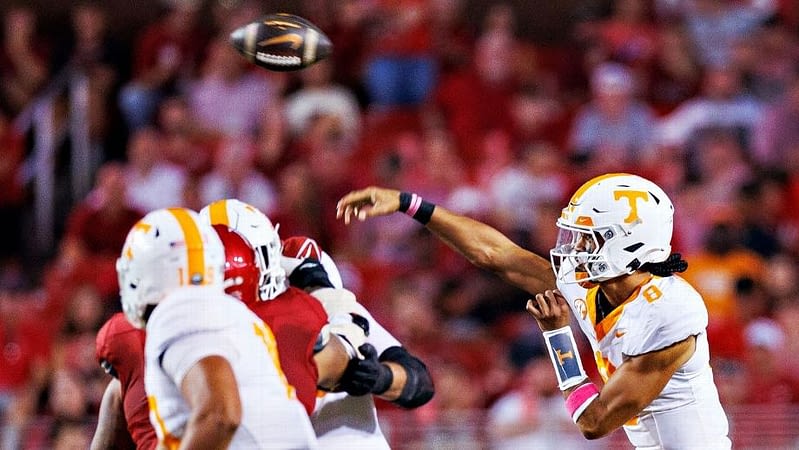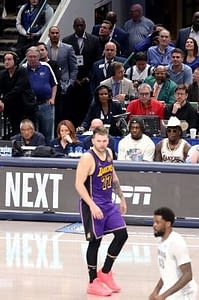Tennessee’s Bold Stand: Navigating the NIL Era with Coach Josh Heupel
It was a Saturday morning like no other for Tennessee coach Josh Heupel as he sat on the team bus, pulling up to the iconic Neyland Stadium for the annual spring game. This wasn’t just any game day; it marked the end of a week that could very well define his career. The Volunteers had just parted ways with their star quarterback, Nico Iamaleava, after a failed attempt to renegotiate his compensation for the 2025 season.
Heupel and Iamaleava had always shared a strong bond, but when the quarterback didn’t show up for practice on Friday, the decision was inevitable. “We’re moving on as a program without him,” Heupel would later state. It’s a tough call, but how can you lead a college team when your quarterback is holding out?
“There’s nobody bigger than the ‘Power T,'” Heupel declared. A powerful statement, indeed, and one that resonated as a rallying cry for coaches across the nation weary of the NIL landscape. “If they want to play holdout, they might as well play get out,” echoed Miami coach Mario Cristobal.
But let’s not forget, this is the SEC. This is major college football, where expectations and pressure are sky-high. In this coaching profession, careers can pivot on a single game, let alone a season. “Do it the right way” only works if you win.
As Heupel stepped off the bus to face a sea of Volunteers fans, his team, at least on paper, seemed less of a contender than it had been just two days earlier. The crowd’s reaction could have gone either way.
Instead, he was met with roaring cheers.
Nico Iamaleava: A Seminal Figure in the NIL Era
Iamaleava’s legacy as a quarterback remains a work in progress for the 20-year-old with three years of collegiate eligibility left. However, in terms of his impact on the early days of the NIL era in college football, he stands as a seminal figure, representing both ends of the player empowerment spectrum.
Back in the spring of 2022, Iamaleava, then a high school junior, agreed to a four-year deal worth approximately $8 million with Tennessee’s NIL collective, Spyre Sports Group. The deal included a $350,000 up-front payment, as reported by the Athletic, with money paid out during his senior season at Warren High School in California.
It was a bold and strategically smart move by Tennessee. While other schools were cautiously navigating the NIL waters and the NCAA was scrambling to establish “guardrails,” the Vols saw the future. When the NCAA challenged the deal, the state’s attorney general stepped in and secured an injunction.
Now, however, the player who was once celebrated and paid millions before becoming the full-time starter is the poster child for NIL backlash. Rather than play out the final season of his deal, which would pay him about $2.2 million, Iamaleava reportedly sought around $4 million, aligning with what other quarterbacks who transferred this year were receiving.
Asking for more was Iamaleava’s right, but with rights come risks. As with any negotiation, you can push too far.
The Fallout and Future for Tennessee and Iamaleava
Iamaleava is a promising and tough player, but 11 of his 19 touchdown passes last season came against lesser competition. He has great potential, but something didn’t sit right in Knoxville with how the process unfolded. This felt obnoxious.
“It’s unfortunate, just the situation and where we’re at with Nico,” Heupel said. “I want to thank him for everything that he’s done since he’s gotten here … a great appreciation for that side of it.”
That said, if being the starter and cornerstone at Tennessee—with its rich history, massive fan base, QB-developing head coach, SEC spotlight, and years of familiarity—isn’t enough without a few more bucks, then so be it. It can’t all be about money, even these days.
“This program’s been around for a long time,” Heupel said. “A lot of great coaches, a lot of great players that came before, laid the cornerstone pieces, the legacy, the tradition that is Tennessee football. It’s going to be around a long time after I’m done and after they’re gone.”
Whatever games Tennessee might lose without Iamaleava, it gained in dignity by drawing a line in the sand. That’s what the fans were rightfully cheering; a boomerang that saw the school claw back some power.
- Iamaleava’s career, his choice: It’s all fair game.
- Tennessee might not even take a step back this season.
- Heupel still has the No. 1 quarterback recruit in the Class of 2026—Faizon Brandon of North Carolina—committed.
Most importantly, the Vols served a very public reminder that spending cash doesn’t assure anything. Money matters, but it has to be on the right guys—just as it is in the NFL or NBA. Think of how some of those big-budget Texas A&M recruiting classes worked out.
Ohio State is believed to have had the largest NIL budget last season. If it had gone to players who cared only about their deals and not each other, the Buckeyes would have collapsed after the loss to Michigan. Instead, they got stronger.
What Iamaleava, once the poster child for players getting their value when he was still a recruit, has become is proof that a team can have values, too. A program has to stand for something.
Tennessee showed it does, and that is why Heupel, at the end of a difficult week, found Tennessee fans standing for something as well. To cheer.
Originally Written by: Dan Wetzel





















